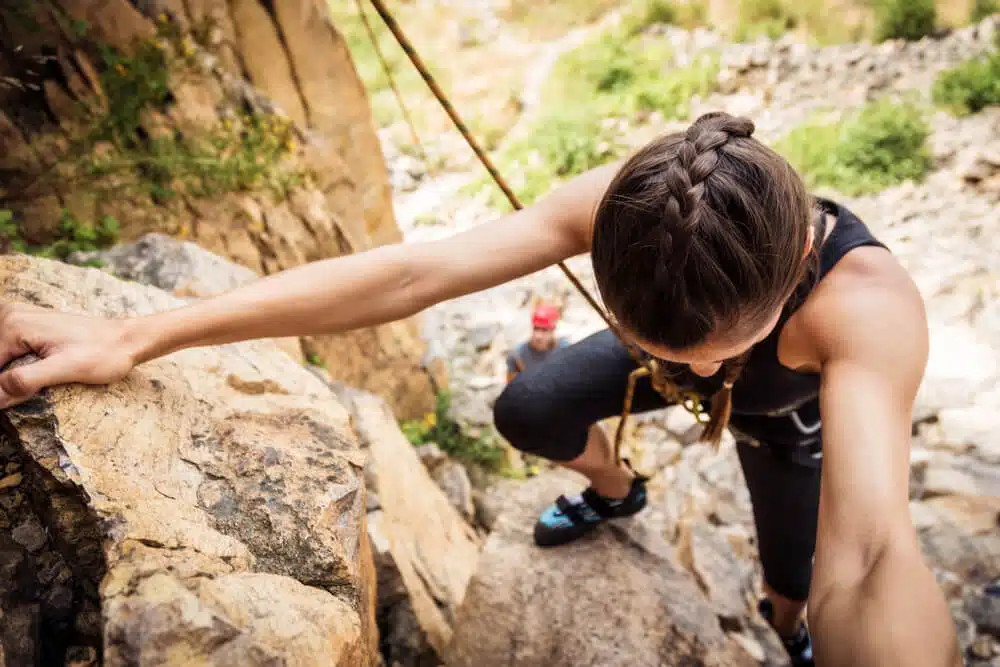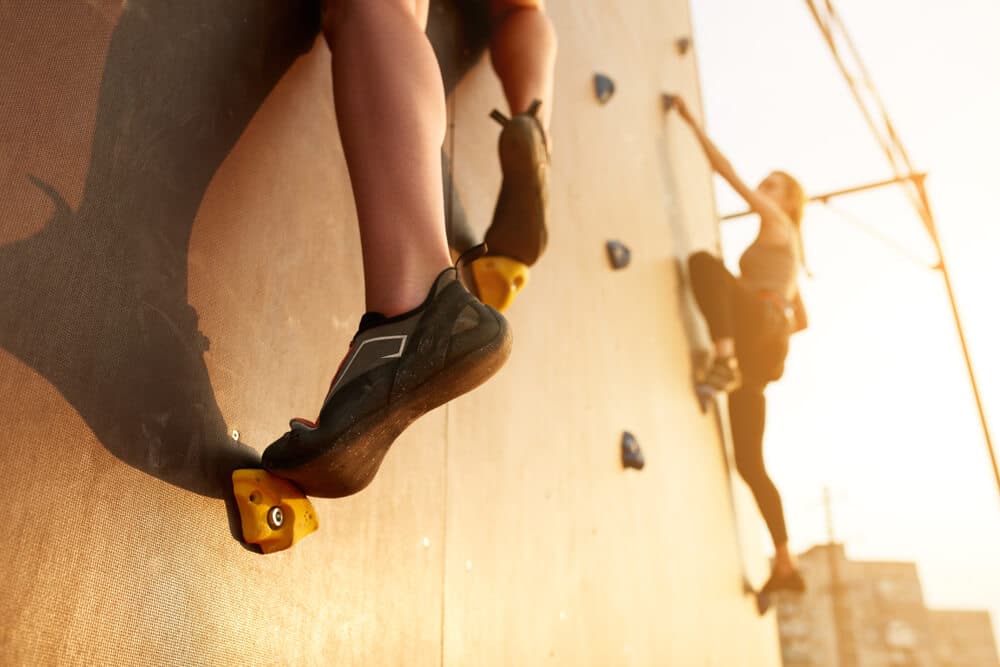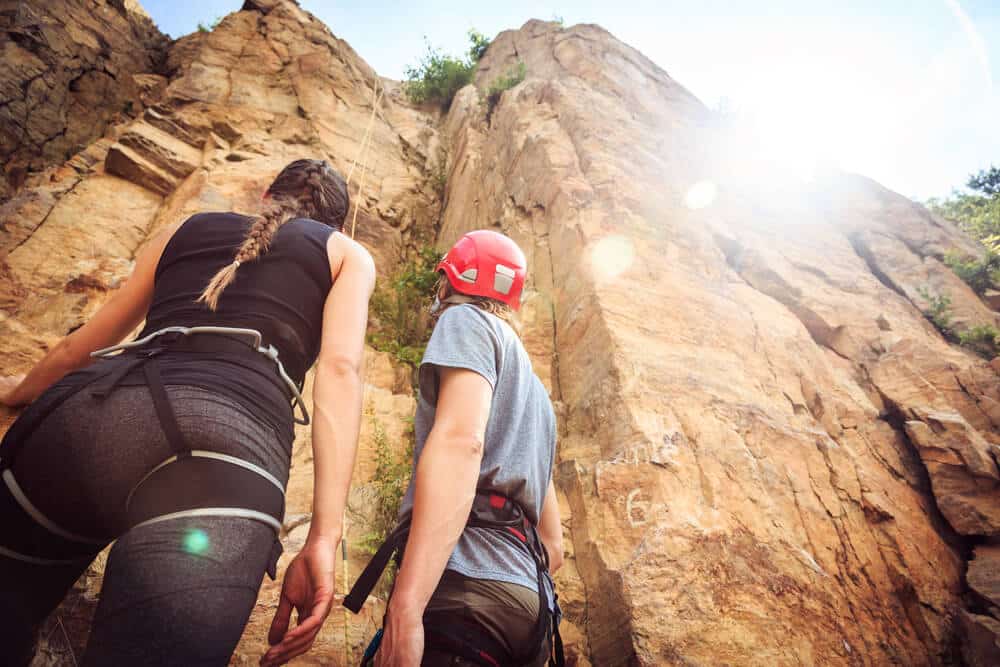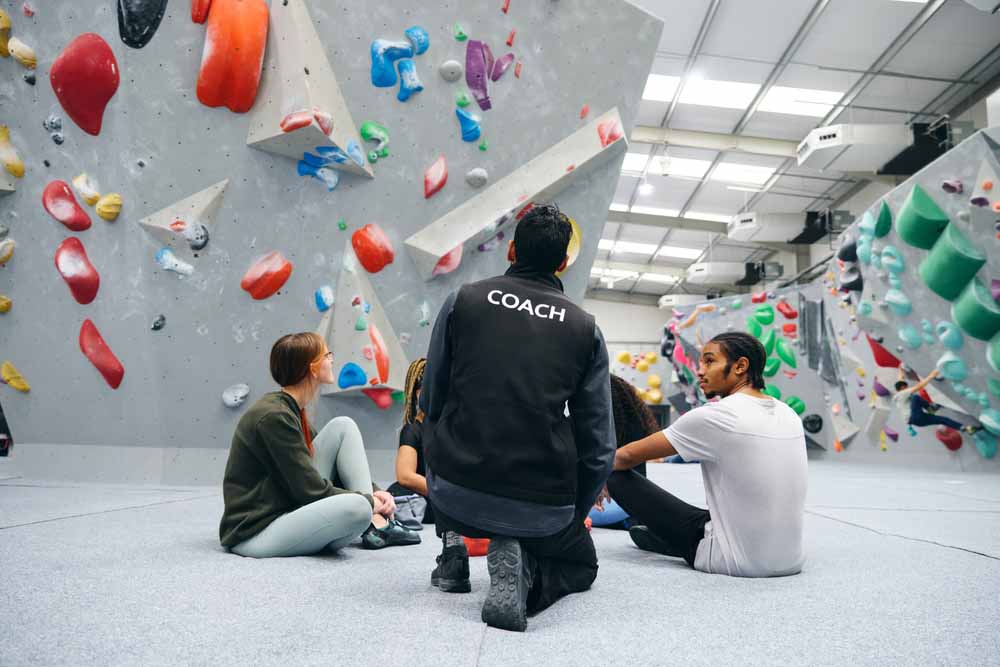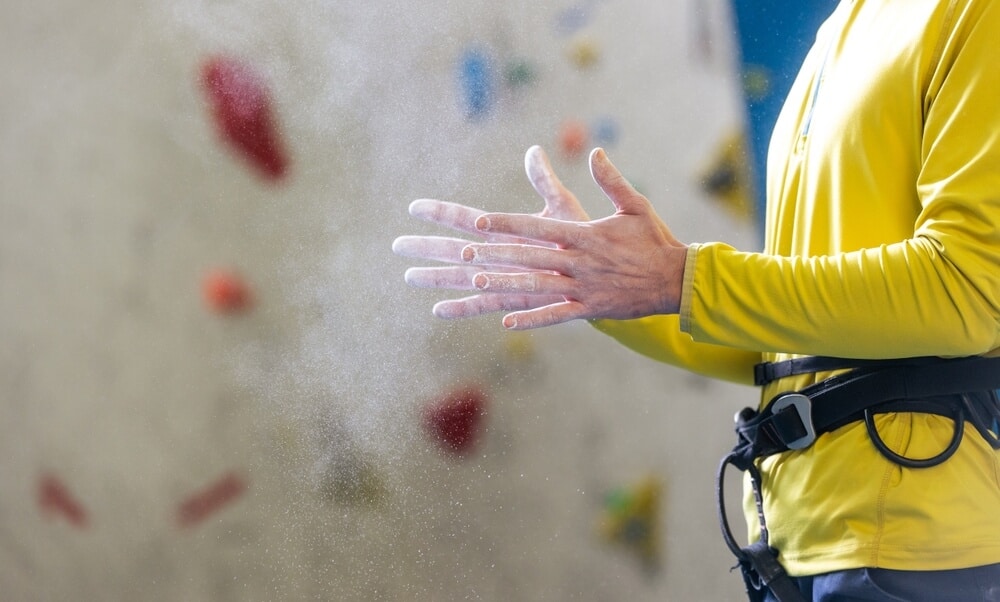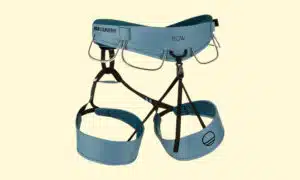Is rock climbing a good way to lose weight? It’s a tricky question. Like any fitness endeavor, climbing burns calories, so it does contribute to weight loss. Rock climbing is also an excellent form of exercise for a variety of reasons, which we’ll dive into below.
But that doesn’t necessarily mean rock climbing is an effective tool for weight loss. Furthermore, high-performance climbing has a long association with generating eating disorders like anorexia, particularly among women and youth (so much so that the IFSC has had to release statements about the issue in the past).
The short story is that although rock climbing is an excellent sport with a lot of health benefits, beginning your journey as a rock climber with the overall goal of “losing weight” isn’t a stellar idea. We’ll explore the subject in depth below.
First, let’s talk about the myriad health benefits of rock climbing, then discuss the relationship between overall body weight and climbing performance, and finally look at what we’ve learned to answer that big question: “Should You Try to Lose Weight Rock Climbing?”
Health Benefits of Rock Climbing
Rock climbing is an excellent form of exercise because it combines both cardiovascular and strength training elements, with a full-body workout. The type of workout you’ll get while climbing will ultimately depend on the discipline you’re pursuing.
Speed climbing, for obvious reasons, is more cardiovascular, while bouldering is more power and strength-focused. Roped climbs, on the other hand, are more endurance-based.
Beyond even this, the specific terrain you’re climbing on will change your workout! Slab routes, for example, are more of a leg workout, testing balance and coordination, while roof climbs are heavy on the upper body and core.
Here are some of climbing’s health benefits:
High Caloric Burn
Rock climbing is a physically demanding activity that can burn a significant number of calories. The exact amount depends on your weight, metabolism, the style of climbing, and the duration, among other factors, but climbing can certainly burn calories. Enough said.
Full-Body Workout
Rock climbing is a rare sport in that it engages almost every major muscle group in the body, including fingers, arms, legs, feet, back, and core.
Regular climbing will improve both strength and endurance throughout your entire body. This full-body engagement helps in building muscle, which in turn increases your resting metabolic rate.
Cardiovascular Health
Climbing, especially when practiced continuously over a period of time, can increase your heart rate and improve cardiovascular health, which is essential for overall fitness.
Notably, the focus required while climbing, along with the physical exertion, can lead to a decrease in stress hormones like cortisol.
In addition, in rock climbing periods of intense exertion are often followed by rest periods (like when belaying). This is similar to interval training, which is known to be effective in improving heart health.
Mental Health
Climbing isn’t just a physical challenge, but a mental one. The problem-solving aspect of climbing can make it a more enjoyable and engaging form of exercise than many other traditional sports or exercise forms.
Different types of climbing (bouldering, sport climbing, trad climbing) and different routes also offer a wide range of experiences, preventing your workout from becoming monotonous. There are always new routes and problems to solve, which keeps things fresh and interesting.
Many climbers also enjoy the sense of community found at a climbing gym or crag, adding a social element to the workout. All told, rock climbing is often quite beneficial for mental health.
Balance, Coordination, and Flexibility
Rock climbing requires a high degree of balance and coordination, as climbers must constantly adjust their positions and weight distribution. (Think of techniques like stemming, flagging, and hooking.)
Climbing regularly will also enhance flexibility. Deciphering complex sequences almost always requires stretching and dynamic body movements.
Your Body Weight and Climbing
Let’s talk about the relationship between your body weight and climbing. Climbing is about going up. Weight holds you down. There’s an obvious conflict there.
But this doesn’t mean being as skinny as possible is the solution. You still need muscle to pull yourself upwards and hold yourself onto the wall. So the strongest climbers are typically the ones with the highest strength-to-weight ratio.
(There are plenty of other factors besides strength of course, like flexibility, balance, coordination, and endurance.)
What does this all mean?
Well, the truth is that as a climber, you want every ounce of your body working for you.
Excess fat doesn’t do you much good. That said, being heavy isn’t necessarily a bad thing, as long as that weight carries a lot of muscle, too.
There are plenty of climbers over 200 pounds who climb 5.13+ (8b) and harder, and there are plenty of folks in the 100-pound range who can barely climb a ladder.
The big answer is if you’re already a climber and you’re looking to improve performance, you shouldn’t worry too much about losing weight. Instead, focus on improving the factors that directly affect climbing performance. You should set your sights on getting stronger, building endurance, improving balance, coordination, flexibility, technique, and so on.
Simply dropping pounds isn’t going to make you a better climber in and of itself if you aren’t building muscle and stamina along with it.
NOTE: The exception to this rule is if you’re not at a healthy weight already. If you’re clinically overweight or obese, then losing weight WILL improve your overall health, and certainly your climbing performance along with it. Just make sure you pursue your weight loss in a healthy manner, with the guidance of a healthcare professional.
Should You Try to Lose Weight Rock Climbing?
There are two types of people who may be reading this article.
The first group is rock climbers who want to improve their performance. We addressed that group above. In short, focus on strength, technique, endurance, and other factors that directly affect climbing performance instead of hyper-fixating on losing weight (unless you’re currently at an unhealthy weight).
The second group is individuals who are looking to lose weight for health reasons and may be considering rock climbing as the solution.
To answer this question, we have look at the concept of weight loss.
The good news is it’s quite simple. Everyone’s metabolism works slightly differently (it’s easier to lose weight for some than others), but weight loss occurs when your body is in a “caloric deficit.”
This means you’re burning more calories than you’re consuming. Basically, your body isn’t getting enough fuel to compensate for the energy it’s spending. When that happens, it has to compensate. So it burns fat. The result? Weight loss!
Calories and Weight Loss
We discussed the relationship between calories and weight loss in-depth in another article about how many calories climbing burns. Here’s a brief excerpt from that piece:
Nutrition for Climbers indicates that the average climber burns around 10 calories per minute of climbing. That’s 600 calories per hour, though it’s rare that someone is actively climbing for an hour. Usually you’ll be taking a few hard burns, then belaying or resting, even if you’re on a big wall.
How do they reach this number? Via a measurement called Metabolic Equivalents (METs). One MET of energy expenditure is equal to 1 calorie per kilogram per hour of activity.
General rock climbing is 8 METS, so for a climber of around 160 pounds (73 kg), you’d take 73 x 8 x 1 hour, and you’d come out with 584 calories burned in an hour-long climbing session.
With this information in mind, you can see that it’s basically impossible to pinpoint an exact amount of calories burnt in a given scenario. 600 calories per hour is a good number for an average weight (160 lbs), but some climbers report as low as 400 or as high as 900.
Summary: The average human burns 600 calories per hour while actively rock climbing.
That’s a considerable amount of calories burned, only a bit less than running. (Running a 10-minute mile for 60 minutes burns around 700 calories.)
But we have to keep in mind that it’s pretty rare to actively climb for an hour nonstop, unless you’re sending a seriously massive pitch.
The kicker though, is that exercise really isn’t the most effective tool for weight loss.
Weight loss is far more influenced by diet than exercise. While rock climbing can contribute to a caloric deficit and increase muscle mass, a balanced diet is crucial for effective weight loss. The real way to lose weight is to ensure that you’re consuming fewer calories than you’re burning, not trying to burn calories as much as possible.
Here are a few more things to consider when you think about rock climbing and losing weight.
Check with a Professional
Always consult with a healthcare professional or a fitness trainer before embarking on a serious weight loss journey, especially if you have any existing health concerns or injuries. They can provide personalized advice based on your health status, and more importantly, tell you if you should even be losing weight in the first place.
Take a Balanced Approach
If you do decide to lose weight, aim for a gradual and sustainable approach. Rapid weight loss can lead to decreased muscle mass and energy, which will negatively impact your climbing performance and overall health. Again, check with a professional!
Nutritional Needs
Climbing is a physically demanding activity. If you’re trying to lose weight and improve as a climber, you can easily get caught up in the weeds and develop an eating disorder. Climbing is notorious for its link to “relative energy deficiency” (RED-S), a disorder where athletes develop a deficiency of food intake to the energy needed.
So ensure that your diet provides enough energy and nutrients to support your climbing sessions and overall health. A dietitian can help create a meal plan that aligns with your weight loss and climbing goals.
Listen to Your Body and Mind
Pay attention to how your body responds to climbing. If you feel excessively tired, weak, or prone to injuries, it might indicate that your body needs more fuel or rest. In addition, consider the mental aspect of both climbing and weight loss. Both activities can be mentally challenging, and it’s important to maintain a healthy and positive mindset.
Conclusion: Climbing and Weight Loss
Rock climbing offers a unique blend of physical and mental challenges, making it an exceptional activity for overall fitness and well-being, rather than just a means to lose weight.
Climbing is a comprehensive workout that engages multiple muscle groups across the body. Arms, legs, back, and core are all put to work constantly, ensuring a balanced development of strength. This full-body engagement not only enhances muscle tone but also improves overall physical endurance and flexibility.
Remember, your strength-to-weight ratio is the key performance factor in your climbing prowess. Developing muscle strength is often more beneficial than merely focusing on weight loss, unless you’re currently living at an unhealthy weight (i.e. clinically obese).
If you are looking to lose weight for health reasons, climbing can certainly help, but you have to recognize that diet, not exercise, is the leading factor in weight loss. Focusing on constructing a sustainable, healthy diet plan with a professional dietician (and sticking to it!) is the fastest and healthiest way to lose weight.
It’s important to remember that physical activities like climbing should be approached with a mindset of self-care and positivity. Focusing solely on weight loss as you jump into rock climbing can overshadow the many other benefits of the sport, including improved mental health, increased strength, and the joy of being part of a vibrant community.
Climbing is about celebrating what your body can do, not just how it looks. It’s about challenging yourself, overcoming obstacles, and enjoying the journey, not just the destination.
Embrace climbing for the plethora of benefits it offers. It’s a journey towards better health, a stronger body, and a more focused mind, all wrapped up in an exhilarating and supportive environment.
Above all else, remember that maintaining a healthy weight is far more important than being a strong climber. Overall health should always come first and climbing performance second. If you keep this in mind, you’re sure to improve your climbing ability along the way!


